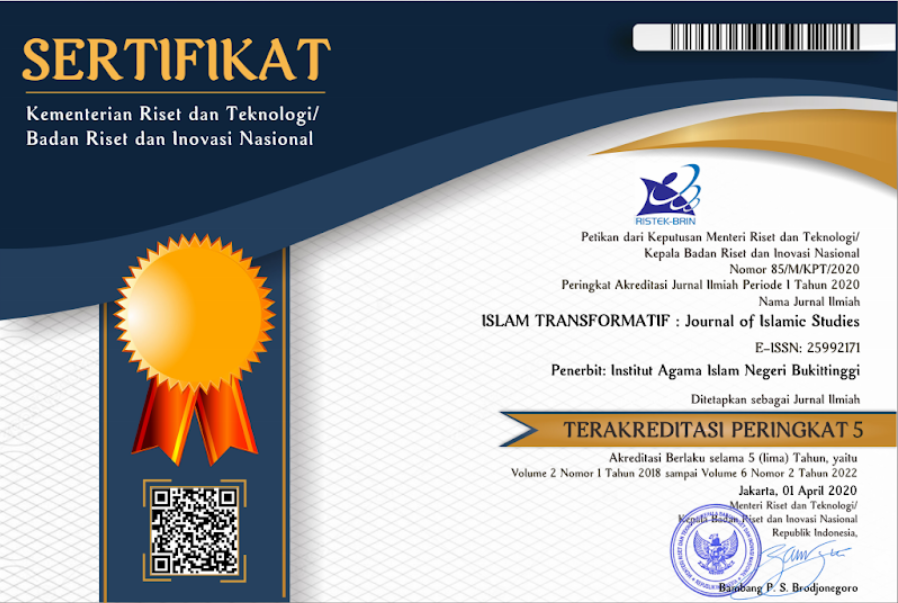APLIKASI HIJAB SHAHABIYAT DI MASA TURUN PERINTAH MENUTUP AURAT (Studi Pemahaman Sosio-Historis Hadis Perilaku Wanita Masa Nabi)
Authors :
Abstract
In the aspect of Islamic shari'a, it stipulates matters of daily application, including the manner of dress which is permissible in the Koran. Women get more attention in this matter, considering that their bodies contain beauty that must be covered so that it does not become a spectacle and slander for the opposite sex which is not their muhrim, it is then called aurat. The opinion of the majority of the Ulama is that male genitalia is from the navel to the knees while the female genitalia is the entire body except the face and palms. This article discusses how the application of the hijab in the days of the decree to close the aurat. hijab in the sense of closing the aurat is the command of Allah through his apostle but the boundary of the hijab is not agreed upon by the ulama. In the early days of sahabiyyat, covering their faces and heads, the implementation of the hijab by covering the entire body, including the head and face, was a response to the obedience of sahaiyyat against the command to use the hijab, not a shari'ah order from the Prophet. over time the trend of hijab appears to be inseparable from each other's understanding of the boundaries of women's genitals so that the veil, niqab, and khimar appear, all of which refer to the order to cover the genitals and are greatly affected by the boundaries of the aurat's understanding and fatwa of the ulema.
Full Text:
PDFReferences
Al-Bukhari Abu `Abdillah, Muhammad bin Isma`il bin Ibrahim al-Mughirah, Shahih Bukhari, Maktabah an-Nahdhah Mekah, 1377 H
Abu Dawud, Sulaiman bin al-Asy-asy bin Syadad bin Amr al-Azdi As-Sijistani, Sunan Abu Dawud, Wuzarat al Auqaf al Mashriyyah t.th
Ali Abul Hasan Al-Khazin, Lubab at-Takwil fi maani at-tanzil, Maktabah Mauqi at-Tafsir
Al-Asqalani, Ibnu Hajar. Fath al-Bari fi Syarh Shahih al-Bukhari. Mesir: Dar Mashr li al-Thaba’ah. 2001.
Afifi Muhammad Abdul Maqshur Fatawa Almar ah almuslimah Maktabah Daru Ibnu al-Haitsam Cairo 2002
Muslim bin Hajjaj Abul Hasan al-Qusyairi an-Naisaburi, Shahih Muslim, Wuzarat al-Auqaf al Mashriyyah, t.th,
Mutawalli, Muhammad Sya’rawi. Tafsir Sya’rawi. tt.
Thantawi, Sayyid, Muhammad, Tafsir Al Wasith li al-Quran al-Karim, tt Dar al Ma’rifah li-at-Thaba’ah
Hakim, Mustadrak ala as-shahihaini, Mauqi Jamiul Hadis,
Ibnu Katsir, Isma’il Abu al-Fida. Tafsir al-Quran al-Adhim. Dar al-Fajr li al-Turats. 2002.
Shihab, Muhammad Quraish. Tafsir al-Mishbah: Pesan, Kesan dan Keserasian al-Quran, Jakarta: Lentera Hati. 2002.
W.J.S Poerwadaminta, Kamus Umum Bahasa Indonesia Edisi Ketiga Jakarta: Balai Pustaka 2007
DOI: http://dx.doi.org/10.30983/it.v2i2.742
Refbacks
- There are currently no refbacks.
Copyright (c) 2018 Muhammad Arpah Nurhayat, Anggi Wahyu Ari
License URL: https://creativecommons.org/licenses/by-sa/4.0/
Islam Transformatif : Journal of Islamic Studies
Indexed By:

Licensed Under © Creative Commons Attribution-ShareAlike 4.0 International License









